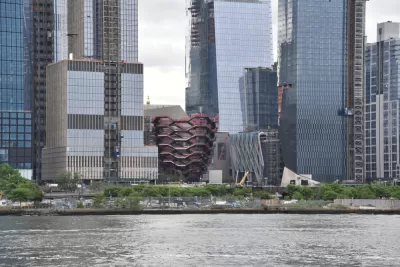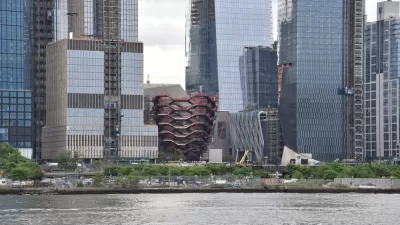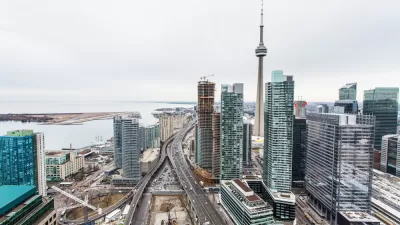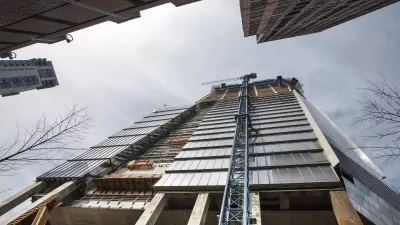When the Manhattan megadevelopment got its start, big data was a major part of Hudson Yards' marketing pitch. Now it's "probably the last thing we'll get to."

"New York's Hudson Yards was once billed as the country's first 'quantified community,'" Emily Nonko writes. "So where is the NASA-like mission control? Data collection and advanced infrastructure will still drive parts of Hudson Yards' operations, but not (yet) as first advertised."
In a pitch that segued with then-mayor Michael Bloomberg's luxe, tech-friendly vision for the city, Hudson Yards was supposed to be "a test bed for a network of sensors meant to provide constant updates to [developers] Related and Oxford. In a city known for grueling walk-ups and miserable subway commutes, data—it was promised—would make 'live, work, and play' (as the marketing lingo goes) easy and adaptable."
But in the intervening years, those developers "have been occupied with the not-so-insignificant task of building a neighborhood." Meanwhile, many of those smart city ambitions have been put on hold. "We concluded that big data is probably the last thing we'll get to. It'll be years from now before we're in that world," said Related Hudson Yards president Jay Cross.
Certain easy-to-implement smart systems are in place at Hudson Yards, including an app serving tenants, touch-screen kiosks for visitors, and fingerprint sensors for office workers. But even so, Nonko asks, "If Hudson Yards—with a seemingly infinite budget and a blank slate—couldn't build it, who can?" And as data collection stirs controversy at other smart city hotspots like Sidewalk Labs' Quayside, does that vision even reflect what people want?
FULL STORY: Hudson Yards Promised a High-Tech Neighborhood—It Was a Greater Challenge Than Expected

Montreal Mall to Become 6,000 Housing Units
Place Versailles will be transformed into a mixed-use complex over the next 25 years.

Planetizen Federal Action Tracker
A weekly monitor of how Trump’s orders and actions are impacting planners and planning in America.

DARTSpace Platform Streamlines Dallas TOD Application Process
The Dallas transit agency hopes a shorter permitting timeline will boost transit-oriented development around rail stations.

Without International Immigrants, the Rural US Population Would Be Falling 58%
Census data shows that population growth in rural areas is due in large part to international migrants.

Dead End: Nine Highways Ready for Retirement
The Freeways Without Futures report describes the nation’s most promising highway removal proposals.

Congressman Proposes Bill to Rename DC Metro “Trump Train”
The Make Autorail Great Again Act would withhold federal funding to the system until the Washington Metropolitan Area Transit Authority (WMATA), rebrands as the Washington Metropolitan Authority for Greater Access (WMAGA).
Urban Design for Planners 1: Software Tools
This six-course series explores essential urban design concepts using open source software and equips planners with the tools they need to participate fully in the urban design process.
Planning for Universal Design
Learn the tools for implementing Universal Design in planning regulations.
City of Mt Shasta
City of Camden Redevelopment Agency
City of Astoria
Transportation Research & Education Center (TREC) at Portland State University
City of Camden Redevelopment Agency
Municipality of Princeton (NJ)
Regional Transportation Commission of Southern Nevada





























